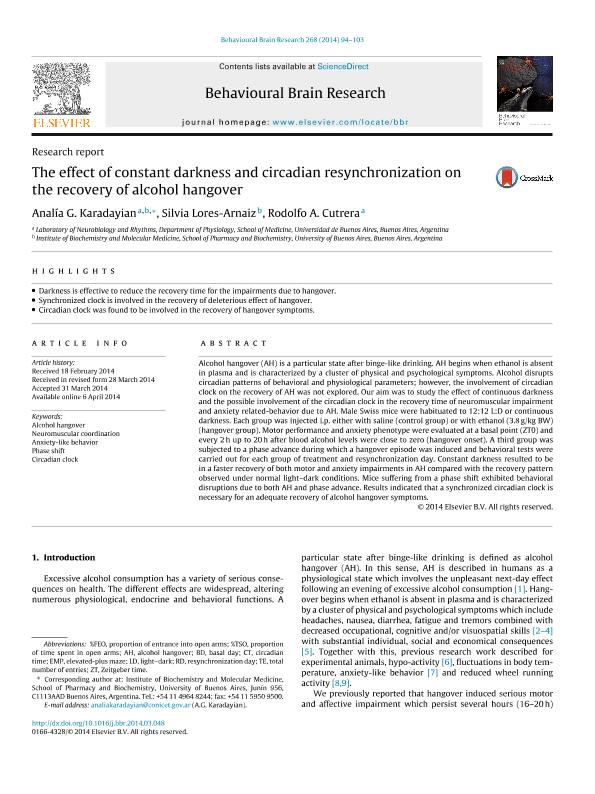Mostrar el registro sencillo del ítem
dc.contributor.author
Karadayian, Analia Graciela

dc.contributor.author
Lores Arnaiz, Silvia

dc.contributor.author
Cutrera, Rodolfo Angel

dc.date.available
2017-03-17T15:10:03Z
dc.date.issued
2014-07
dc.identifier.citation
Karadayian, Analia Graciela; Lores Arnaiz, Silvia; Cutrera, Rodolfo Angel; The effect of constant darkness and circadian resynchronization on the recovery of alcohol hangover; Elsevier Science; Behavioural Brain Research; 268; 7-2014; 94-103
dc.identifier.issn
0166-4328
dc.identifier.uri
http://hdl.handle.net/11336/14013
dc.description.abstract
Alcohol hangover (AH) is a particular state after binge-like drinking. AH begins when ethanol is absent in plasma and is characterized by a cluster of physical and psychological symptoms. Alcohol disrupts circadian patterns of behavioral and physiological parameters; however, the involvement of circadian clock on the recovery of AH was not explored. Our aim was to study the effect of continuous darkness and the possible involvement of the circadian clock in the recovery time of neuromuscular impairment and anxiety related-behavior due to AH. Male Swiss mice were habituated to 12:12 L:D or continuous darkness. Each group was injected i.p. either with saline (control group) or with ethanol (3.8 g/kg BW) (hangover group). Motor performance and anxiety phenotype were evaluated at a basal point (ZT0) and every 2 h up to 20 h after blood alcohol levels were close to zero (hangover onset). A third group was subjected to a phase advance during which a hangover episode was induced and behavioral tests were carried out for each group of treatment and resynchronization day. Constant darkness resulted to be in a faster recovery of both motor and anxiety impairments in AH compared with the recovery pattern observed under normal light–dark conditions. Mice suffering from a phase shift exhibited behavioral disruptions due to both AH and phase advance. Results indicated that a synchronized circadian clock is necessary for an adequate recovery of alcohol hangover symptoms.
dc.format
application/pdf
dc.language.iso
eng
dc.publisher
Elsevier Science

dc.rights
info:eu-repo/semantics/openAccess
dc.rights.uri
https://creativecommons.org/licenses/by-nc-nd/2.5/ar/
dc.subject
Alcohol Hangover
dc.subject
Neuromuscular Coordination
dc.subject
Anxiety Like Behavior
dc.subject
Phase Shift
dc.subject
Circadian Clock
dc.subject.classification
Fisiología

dc.subject.classification
Medicina Básica

dc.subject.classification
CIENCIAS MÉDICAS Y DE LA SALUD

dc.title
The effect of constant darkness and circadian resynchronization on the recovery of alcohol hangover
dc.type
info:eu-repo/semantics/article
dc.type
info:ar-repo/semantics/artículo
dc.type
info:eu-repo/semantics/publishedVersion
dc.date.updated
2017-03-17T14:36:32Z
dc.journal.volume
268
dc.journal.pagination
94-103
dc.journal.pais
Países Bajos

dc.journal.ciudad
Ámsterdam
dc.description.fil
Fil: Karadayian, Analia Graciela. Consejo Nacional de Investigaciones Científicas y Técnicas. Oficina de Coordinación Administrativa Houssay. Instituto de Bioquímica y Medicina Molecular; Argentina. Universidad de Buenos Aires. Facultad de Medicina; Argentina
dc.description.fil
Fil: Lores Arnaiz, Silvia. Consejo Nacional de Investigaciones Científicas y Técnicas. Oficina de Coordinación Administrativa Houssay. Instituto de Bioquímica y Medicina Molecular; Argentina
dc.description.fil
Fil: Cutrera, Rodolfo Angel. Universidad de Buenos Aires. Facultad de Medicina; Argentina. Consejo Nacional de Investigaciones Científicas y Técnicas; Argentina
dc.journal.title
Behavioural Brain Research

dc.relation.alternativeid
info:eu-repo/semantics/altIdentifier/url/http://www.sciencedirect.com/science/article/pii/S0166432814002149
dc.relation.alternativeid
info:eu-repo/semantics/altIdentifier/doi/http://dx.doi.org/10.1016/j.bbr.2014.03.048
Archivos asociados
